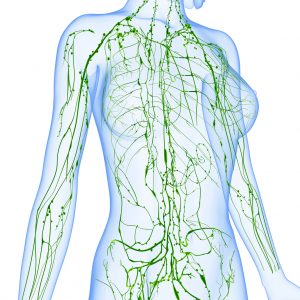The flow of lymph in the hands and feet is a condition for proper metabolism in the muscles and connective tissue. An elevated body temperature in one or more parts of the body means an elevated temperature of the lymph. A low body temperature in one or more places means the cooling of the lymph in the skin, which indicates a very poor function of the skin, maybe even death of the skin and severe overheating of the inside of the body. An elevated lymph temperature is a sign of acidification of the body, poor liver function and overheating of the skin. Lowered lymph temperature means the cooling of one or more organs in the body, which is manifested in the low temperature of one or more parts of the skin and changes on it. Changes in skin temperature, color, elasticity, humidity, allergies, eczema and also in the death of the skin are the result of the death of the upper part of the skin, the whole skin with the subcutaneous tissue and the associated blood vessels. Melanoma is a cancer of a special part of the skin that is primarily connected to the lymphatic system. In this case, it is strongly acidified and burdened with sewage. An acidified lymphatic system indicates poor functioning of the gastrointestinal tract, especially the liver and kidneys, and excessive functioning of the adrenal gland.
Lymph is the liquid part of the blood in the lymphatic system that the body uses for heating and cooling. For cooling, the body uses lymph when it flows from the blood back into the intercellular space (acsites or free fluid in the abdomen, lymphatic congestion). To warm the body, it uses lymph during the flow of lymph into the blood (into the subclavian vein). Therefore, the rule applies: when the veins narrow, the lymph flows into the blood, and when the veins expand, it passes back into the intercellular fluid. Stagnation of blood in the veins also means stagnation of lymph, which is why the lymph is tied to the venous system, that is, to a system that is dirty and cleans it. This also means that it flows in the opposite direction to the arterial system. It is precisely because of these physical characteristics that the circulation of the entire body depends on the lymphatic system. Overheating of a certain organ also means overheating and stagnation of lymph in that organ, not only dilation of veins and overheating of arteries in that organ. That is why it is good to know that the lymphatic system is responsible for cooling overheated organs. If the lymph is unable to cool the overheated organs, their function fails. Here is also the cause of the onset of cancer. The use of Limfol ensures the correct flow of lymph into the blood, thereby preventing lymphatic and venous congestion. Pain means lymph stagnation, and when we eliminate lymph stagnation, we also eliminate pain. If the lymph is too warm, the blood circulation is so bad that the organ no longer gets enough food. This can be prevented by cooling the body, using the right food and cooling the blood. Only when the blood cools can we cool the lymph, which, if it is overheated, is also full of sewage and overheated hormones. Overheated hormones are no longer carriers of information, they are no longer active, they become sewage, which is why complete confusion occurs in the body. With traditional blood hormone tests, it is not possible to investigate the activity of hormones, but only to determine their presence. Thus, the presence of hormones in the blood does not mean that the glands are functioning properly. This is also confirmed in our daily practice, when people have obvious signs of overactive or underactive thyroid, and laboratory results are still within normal limits.



